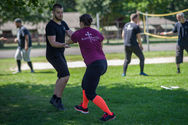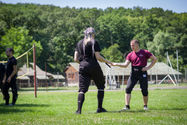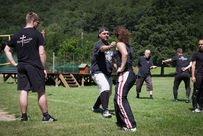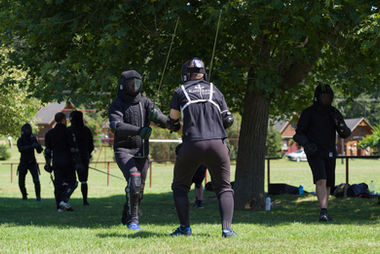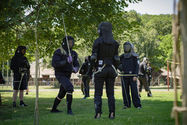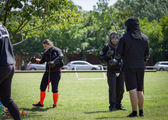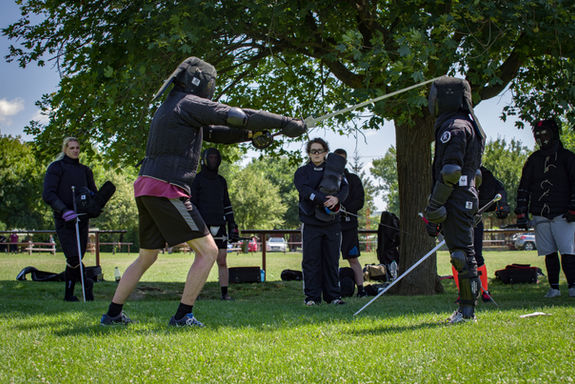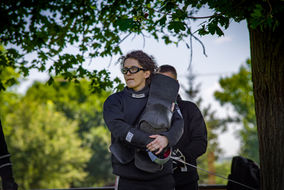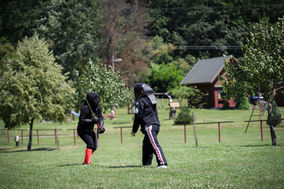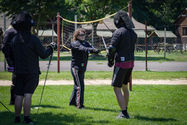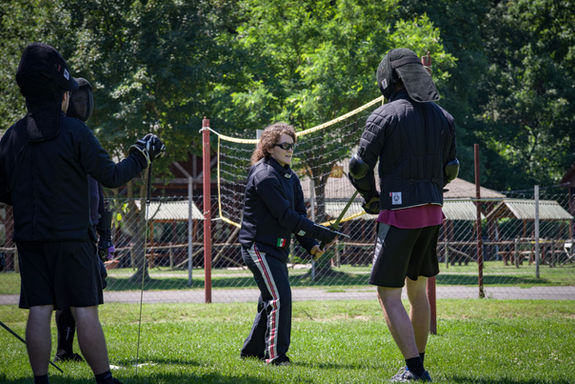Coaching for HEMA
This site has been created to introduce the work I, my friends and my coaches are doing to bring professional fencing coaching together with the arts of historical European weapons. Our goal is to develop coaching methods that respect the weapon-specific technical material. For this reason, we run our project strictly as a cooperation of researchers of historical arts, and fencing coaches, where each represents their own area of expertise, and respects each other's judgment, during the evaluation of our possibilities, experiments and results.
In the last few years we have developed a refereeing education program with the option to gain license to the Slovak and Czech tournaments, and lectures and workshops that set the ground for a systematic tactical education in Historical European Martial Arts.
Here you can find news and articles of our work, and you can contact us to get involved, start a discussion, or to order our services.
 |  |  |  |  |
|---|---|---|---|---|
 |  |  |  |  |
 |  |  |  |
The HEMAtac team

András Berki
András had been an experienced HEMA researcher and instructor before I (K) set foot in a HEMA training for the first time, around 2005. After a fairly adventurous journey in our own separate careers, we started to work together again when the KRViSE klub decided to open to modern coaching practices, and this has turned into a long lasting alliance. From talking and mocking fencing excercises during hikes in the mountains, to countless online discussions, workshops, international projects, refereeing studies, competition organising, and to planning out the coaching education now provided to instructors of his club, we've been working together to improve the education and opportunities that KRViSE offers to its fencers and coaches.
Now, I am proud to say that András is joining us officially, as a member of the HEMAtac team.
Maciej Talaga
I started learning HEMA in 2007 under the tutelage of Bart Walczak from ARMA-PL. Since 2009 I have pursued this passion even deeper by becoming an instructor and starting my own research into the so-called Nuremberg Codex (GNM 3227a). Working with that manual as well as trying to find better ways to help my students advance their competitive efficiency inspired me to have a closer look at the Olympic fencing.
I expected the epee to have most parallels to the early German longsword, so between 2012 and 2016 I have cross-trained in epee and longsword. This experience not only improved my performance in tournaments, but also helped me develop as a teacher. I started experimenting with training methodology and individual lessons in 2014, and in 2016 I received my Olympic fencing instructor’s licence from the Polish Fencing Association. On top of that, in 2017 I started Sprechfenster Blog, a YouTube channel aimed at promoting individual lessons and Olympic fencing methodology adapted for HEMA.


Dr Łukasz Majewski
As a fencing coach and a lawyer I take care of two sport clubs in Warsaw. I’ve also been present in the Polish HEMA movement for about 20 years. I specialize in tactical analysis of fencing as well as the preparation of individual fencers. I am working with the Polish HEMA Federation (FEDER) as a coach of the National Team. The record of my students shows that I am quite efficient in applying the extensive methodology of fencing to HEMA trainings and thus adding an extra edge to both the competitive and the teaching skills of the fencers I work with. I am also an accomplished referee, experienced in the development and the application of tournament rules.
Krisztina Nagy
In 2012, I left the competitive HEMA scene, to learn sabre fencing, and fencing coaching. Beside fencing competitively, I became a coach, and assisted in international coaching trainings. I always hoped that I could eventually bring back this knowledge of methodology and tactical education to the world of historical weapons.
In 2016, I started a cooperation with my former club and ever since friends in Trnava, and soon our work with the Hungarian Kard Rendje began. Our goal is to introduce and attune the achievements of fencing coaching and sport-science to the requirements and environment of HEMA, for the benefit of learning efficiency, and also importantly, competitive performance.
We are runnig a yearly recurring competition series, an integrated refereeing training programme, and I am proud to say that participants of our most recent coaching training program are soon going to join the HEMAtac team as well.

Kard Rendje summer training camp
14 July 2018
Last month, Krisztina spent a day at the Kard Rendje summer camp, working with the fencers who arrived from all three cities where the club operates. It was an opportunity to discuss our goals, methods, and practices established together in the Budapest sessions so far.
The events of the day included two training sessions together (involving partner exercises, technical work both for fencing and basic coaching technique, and tactical feedback during bouts), a lecture about various competition-systems, introduction to the theoretical basics of refereeing, and the conclusion of the competition-series that ran during the camp offering training to fencers and referees alike.
We got to know fencers we had no other occasion to meet before, exchanged views, and discussed our goals in order to create a common ground for all faculties belonging to the organisation. A solid circle of future referees seemed to be forming as well, showing good potential as they directed the bouts – they will surely be seen working in international competitions soon.
Photos by Endre János Kovács.
Coaching project starts at Kard Rendje, Hungary
01 February 2018
HEMAtac and the Hungarian HEMA club Kard Rendje have started to cooperate in order to improve the club's athletes' preparation for competitions. In March, we have published our first Training Log as part of our planned series of reports. If you are interested in our work, follow us on Facebook, or visit the Blog!
Maciej Talaga joins HEMAtac
15 December 2017
We are honored to welcome on board Maciej Talaga, longsword coach at ARMA-PL! He is internationally known for having developed methods of individual lessons for longsword, as well as his competitive performance. His weapon-specific knowledge along with experience in fencing coaching is essential for the HEMAtac project, in creating precise and efficient training programs and methods suitable for the fast progressing demands of this weapon. His short bio is available above on this site.
Rulebooks, documents
A Combat-style Rulebook
A detailed rulebook has been created for a discontinued project in 2015, by current HEMAtac members. Here you can find an outline of the rather thick tome of rules, which might be of interest to the public, for its format and style. This is the first Rulebook represented here, but not to express our preference for a specific approach in the rule-creation, but rather that for the style of addressing regulations in general. Nonetheless, this rulebook has been written with care, and represents one of the many approaches that can be applied to HEMA competitions. It's undeniable that the FIE rulebook was used as framework, since it includes a century worth of experience in the peculiarities of fencers and competitions.
The complete list of contributors can be seen within the document.
A Conventional Rule Book
After we have published the Combat rulebook, we decided to prepare its Conventional counterpart. This document contains conventional rules (only for Longsword), based on discussions with Slovak and French fencers, referees and competition organisers. We might modify parts of it later as our experience increases. The style and environment are similar to the Combat book, while the other weapons have been removed and the Longsword rules changed. This book is far from being complete in terms of being able to regulate an entire system of competition organising, it is just a summary of the most important details.
As before, our goal is not to express our preference for a specific approach in the rule-creation, but rather that for the style of addressing regulations in general. Nonetheless, this rulebook has been written with care, and represents one of the many approaches that can be applied to HEMA competitions. The FIE rulebook was used as framework, since it includes a century worth of experience in the peculiarities of fencers and competitions.
Safe Outcome of the Sabre Duel by Felso-Eory, 1901
This book on the roles of mental preparation and human character in the outcome of sabre duels was written from the point of view of the military man. It allows insight in the often harsh reality of the dueling of the era, and beside listing requirements and suggestions that shall ensure minimal damage in affairs of honour, he often points out differences in the mentality of duelists for various legal or social reasons, and fencers. A translation project I had started around 2012, but was brought to a successful finish in 2015, with the invaluable contributions of Mr. Jeffrey Hull, who generously offered to be the editor of the final work, and has done.
Contact
We’d be happy to provide you with additional information about courses and projects. Just drop us a line.












